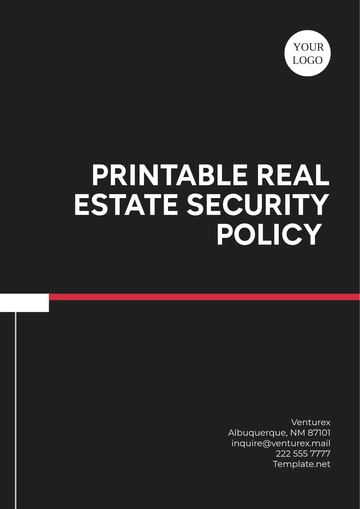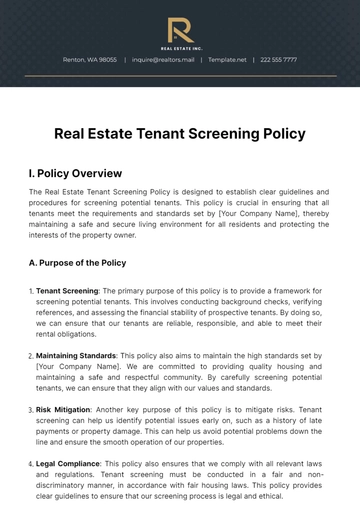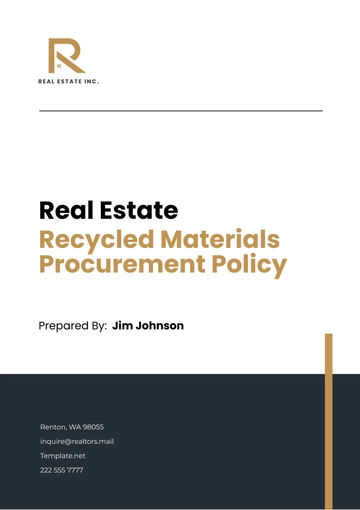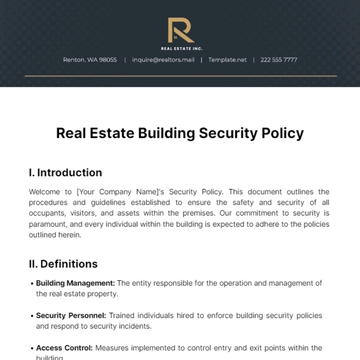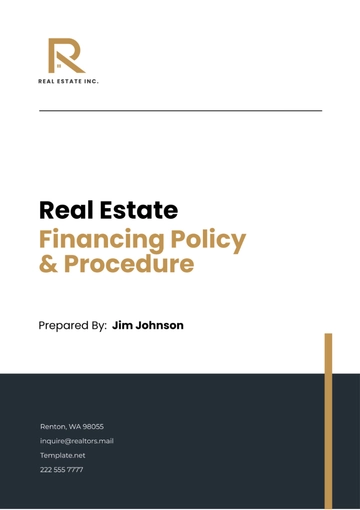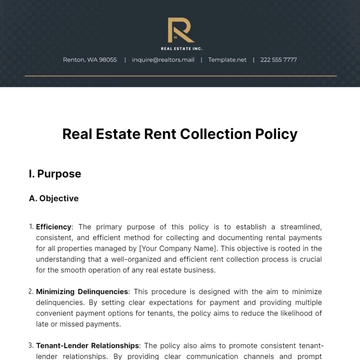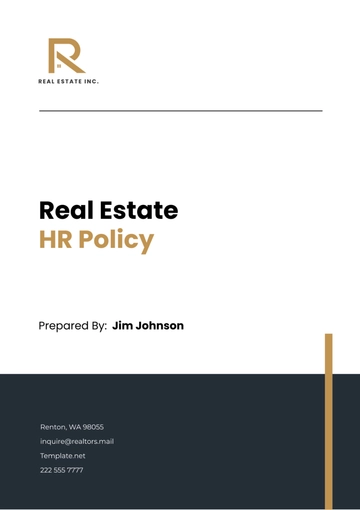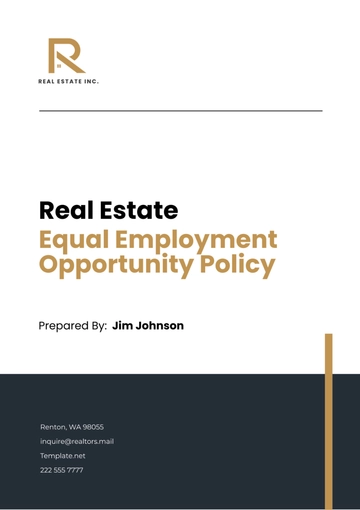Free Real Estate Tenant Screening Policy
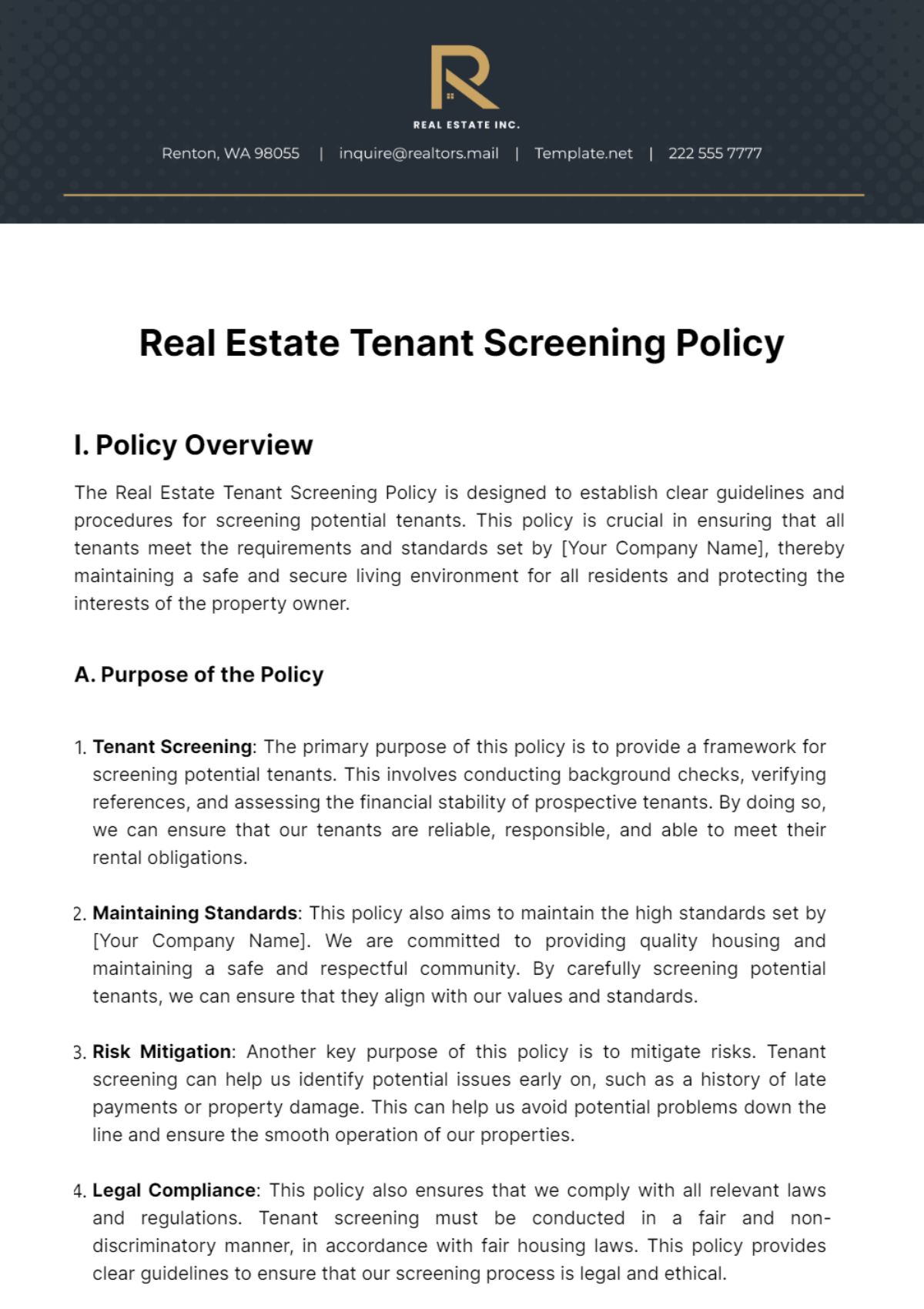
I. Policy Overview
The Real Estate Tenant Screening Policy is designed to establish clear guidelines and procedures for screening potential tenants. This policy is crucial in ensuring that all tenants meet the requirements and standards set by [Your Company Name], thereby maintaining a safe and secure living environment for all residents and protecting the interests of the property owner.
A. Purpose of the Policy
Tenant Screening: The primary purpose of this policy is to provide a framework for screening potential tenants. This involves conducting background checks, verifying references, and assessing the financial stability of prospective tenants. By doing so, we can ensure that our tenants are reliable, responsible, and able to meet their rental obligations.
Maintaining Standards: This policy also aims to maintain the high standards set by [Your Company Name]. We are committed to providing quality housing and maintaining a safe and respectful community. By carefully screening potential tenants, we can ensure that they align with our values and standards.
Risk Mitigation: Another key purpose of this policy is to mitigate risks. Tenant screening can help us identify potential issues early on, such as a history of late payments or property damage. This can help us avoid potential problems down the line and ensure the smooth operation of our properties.
Legal Compliance: This policy also ensures that we comply with all relevant laws and regulations. Tenant screening must be conducted in a fair and non-discriminatory manner, in accordance with fair housing laws. This policy provides clear guidelines to ensure that our screening process is legal and ethical.
Transparency: Finally, this policy aims to provide transparency. By clearly outlining our tenant screening process, we can ensure that prospective tenants understand what to expect and what is expected of them. This can help build trust and foster good relationships with our tenants.
B. Scope of the Policy
Applicability: This policy applies to all potential tenants of properties managed by [Your Company Name]. It outlines the steps that will be taken to screen these individuals and the criteria that will be used to assess their suitability as tenants.
Policy Enforcement: The enforcement of this policy is the responsibility of the company and its property management team. They are responsible for ensuring that the policy is followed consistently and fairly in all cases.
Policy Review: This policy will be reviewed regularly to ensure that it remains effective and up-to-date. This includes ensuring that the policy continues to comply with any changes in relevant laws and regulations, and that it continues to meet the needs of the business and its tenants.
Exceptions: Any exceptions to this policy must be approved by a senior manager of the company. This ensures that any deviations from the policy are carefully considered and justified.
II. Screening Criteria
We established a set of screening criteria to ensure that all prospective tenants meet our standards. These criteria are designed to assess the suitability of potential tenants and ensure a safe and respectful living environment for all residents. The following table showcases an overview of the criteria:
Criteria | Details |
|---|---|
Government-Issued Photo ID | Prospective tenants must provide a valid government-issued photo ID. |
Rental Application Form | Applicants are required to complete a detailed rental application form for information gathering. |
Proof of Income and Employment | Proof of income and employment is necessary for evaluating financial stability. |
Credit Check and Background Check | Credit and background checks are conducted to assess credit history. |
References from Previous Landlords | Applicants must provide references from previous landlords for reference checks. |
A. Government-Issued Photo ID
Identity Verification: Prospective tenants must provide a valid government-issued photo ID. This is a crucial step in verifying the identity of the applicant. It helps us ensure that the information provided by the applicant is accurate and reliable.
Fraud Prevention: Checking a government-issued photo ID also helps prevent fraud. It allows us to confirm that the applicant is who they claim to be and that they have not provided false information on their application.
Legal Compliance: Verifying the identity of applicants is also a legal requirement in many jurisdictions. It helps ensure that we are in compliance with laws and regulations related to tenant screening.
Record Keeping: The information from the photo ID will be securely stored and used for record-keeping purposes. It will not be shared with third parties without the consent of the applicant.
Confidentiality: We respect the privacy of our applicants. All personal information provided during the screening process will be handled in accordance with our privacy policy and applicable privacy laws.
B. Rental Application Form
Information Gathering: Prospective tenants must complete a rental application form. This form collects important information about the applicant, such as their rental history, employment status, and income level.
Assessing Suitability: The information provided on the rental application form helps us assess the suitability of the applicant. It allows us to determine whether they can afford the rent, whether they have a history of responsible tenancy, and whether they meet our other criteria.
Consistency Check: The rental application form also allows us to check the consistency of the information provided by the applicant. We can cross-reference the information on the form with the information obtained through other parts of the screening process.
Legal Compliance: The rental application form is designed to comply with all relevant laws and regulations. It does not ask for any information that is not allowed to be considered in the tenant screening process.
C. Proof of Income and Employment
Financial Stability: Prospective tenants must provide proof of income and employment. This helps us assess their financial stability and ability to pay rent on time.
Income Verification: Acceptable forms of proof of income may include pay stubs, bank statements, or a letter from the employer. These documents provide evidence of the applicant’s current income level.
Employment Verification: We may also contact the applicant’s employer to verify their employment status. This helps us confirm that the applicant has a stable source of income.
Rent-to-Income Ratio: We typically look for a rent-to-income ratio of around [30]%. This means that the monthly rent should not exceed [30]% of the applicant’s monthly income. This ratio is a common guideline used to assess housing affordability.
Confidentiality: As with all personal information, proof of income and employment will be handled with strict confidentiality. It will be used solely for the purpose of assessing the applicant’s suitability as a tenant.
D. Credit Check and Background Check
Credit Check: A credit check is an essential part of our screening process. It provides us with information about the applicant’s credit history, including any late payments, defaults, or bankruptcies. This information helps us assess the applicant’s financial responsibility and reliability.
Background Check: In addition to a credit check, we also conduct a background check on all prospective tenants. This check can reveal important information about the applicant’s past, including any criminal records or eviction history. It’s important to note that all information obtained through the background check will be used in accordance with local laws and regulations.
Fair and Equitable Screening: It’s important to note that our credit and background checks are conducted in a fair and equitable manner. We adhere to all relevant laws and regulations, including those related to discrimination and privacy.
Confidentiality: As with all personal information, the results of credit and background checks are handled with strict confidentiality. They are used solely for the purpose of assessing the applicant’s suitability as a tenant.
Informed Consent: Before conducting a credit or background check, we obtain the applicant’s informed consent. We explain what the check involves, why it’s being conducted, and how the information will be used.
E. References from Previous Landlords
Reference Checks: We require prospective tenants to provide references from their previous landlords. These references can provide valuable insights into the applicant’s behavior as a tenant, including their respect for the property and their relationship with neighbors and landlords.
Verification: We contact the provided references to verify the information given by the prospective tenant. This helps us ensure the accuracy of the information and gives us a more complete picture of the applicant.
Insights: Speaking with previous landlords can give us insights into the applicant’s reliability when it comes to paying rent on time, their general behavior, and whether they left the property in good condition.
Decision Making: The information obtained from these references plays a crucial role in our decision-making process. However, it is just one of many factors we consider when assessing a prospective tenant’s suitability.
Confidentiality: As always, all information obtained from references is kept confidential and used solely for the purpose of assessing the applicant’s suitability as a tenant.
III. Application Process
The application process is a critical part of our Tenant Screening Policy. Upon receiving a rental application, the applicant’s information will be verified and assessed according to the screening criteria. This comprehensive process ensures that we select tenants who meet our standards and contribute positively to our properties.
A. Receiving the Application
Application Collection: When a prospective tenant submits a rental application, it marks the beginning of our screening process. The application provides us with essential information about the applicant, which forms the basis for our assessment.
1.1. Initial Review: Upon receipt, an initial review of the application is conducted to ensure all necessary fields have been filled out and the information provided appears consistent and plausible.
1.2. Documentation Check: We also check that all required supporting documents have been submitted with the application. This includes proof of income, references, and identification documents.
Preliminary Review: Upon receiving the application, we conduct a preliminary review to ensure that all required information has been provided. This includes personal details, employment information, rental history, and other relevant data.
2.1. Completeness Check: We check that all sections of the application form have been filled out and that no necessary information is missing.
2.2. Accuracy Check: We also check for any obvious inaccuracies or inconsistencies in the information provided.
Confidentiality Assurance: We understand the sensitive nature of the information provided in the rental application. Therefore, we assure applicants that their information will be handled with strict confidentiality and used solely for the purpose of assessing their suitability as a tenant.
3.1. Data Protection: We adhere to strict data protection policies to ensure that applicants’ personal information is securely stored and not shared with unauthorized parties.
3.2. Privacy Policy: We inform applicants of our privacy policy, which outlines how we collect, use, and store their personal information.
Application Acknowledgment: After the preliminary review, we acknowledge receipt of the application. This acknowledgment informs the applicant that their application is being processed and provides an estimated timeline for the screening process.
B. Verification and Assessment
Verification Process: The verification process involves checking the accuracy of the information provided in the rental application. This may include contacting employers to verify employment and income, checking references, and validating other provided information.
1.1. Employment Verification: We contact the applicant’s employer to confirm their employment status and income. This helps us ensure that the applicant has a stable source of income and can afford the rent.
1.2. Reference Verification: We contact the references provided by the applicant to learn more about their rental history and behavior as a tenant. This can provide valuable insights into their reliability and suitability as a tenant.
Assessment Criteria: The assessment of the application is based on the screening criteria outlined in our Tenant Screening Policy. These criteria ensure that we select tenants who are likely to be reliable, responsible, and respectful.
2.1. Creditworthiness: We assess the applicant’s creditworthiness by conducting a credit check. This gives us insights into their financial behavior and ability to manage their financial obligations.
2.2. Rental History: We consider the applicant’s rental history, including their behavior as a tenant and their relationship with previous landlords. This helps us assess their reliability and likelihood to respect the rental property and terms of the lease.
Credit and Background Checks: As part of the assessment, we conduct credit checks and background checks. These checks provide valuable insights into the applicant’s financial responsibility and past behavior.
3.1. Credit Check: A credit check provides us with information about the applicant’s credit history, including any late payments, defaults, or bankruptcies. This information helps us assess the applicant’s financial responsibility and reliability.
3.2. Background Check: A background check can reveal important information about the applicant’s past, including any criminal records or eviction history. It’s important to note that all information obtained through the background check will be used in accordance with local laws and regulations.
Reference Checks: We also contact the references provided by the applicant. These references, typically previous landlords, can provide insights into the applicant’s behavior as a tenant.
4.1. Previous Landlords: We contact previous landlords to inquire about the applicant’s behavior as a tenant. This can include questions about their timeliness in paying rent, their care for the property, and their overall conduct during the lease period.
4.2. Personal References: We may also contact personal references to get a broader understanding of the applicant’s character and reliability.
IV. Decision Making
The decision-making process is a critical part of our policy. It involves evaluating whether the applicant meets all the screening criteria and making a decision about their tenancy. This process is conducted in a fair and transparent manner, with all applicants being treated equally.
A. Approval Process
Criteria Assessment: If the applicant meets all the screening criteria, they will be approved for tenancy. This means that they have successfully passed all the checks and verifications, and have demonstrated their reliability and suitability as a tenant.
Lease Preparation: Upon approval, the next step is to prepare the lease agreement. This document outlines the terms and conditions of the tenancy, including the rent amount, lease duration, and the rights and responsibilities of both parties.
Tenant Onboarding: Once the lease is signed, we proceed with the tenant onboarding process. This involves providing the tenant with information about the property, setting up rent payments, and handing over the keys.
Continuous Communication: Throughout the approval process, we maintain open and timely communication with the applicant. We inform them of their application status and next steps, ensuring a smooth and positive experience.
Record Keeping: We keep a record of all approved applications for future reference. This helps us maintain transparency and can be useful for future tenant management.
B. Denial Process
Criteria Assessment: If the applicant fails to meet any of the screening criteria, they will be denied tenancy. This could be due to a variety of reasons, such as a poor credit history, negative references, or insufficient income.
Reason for Denial: When denying an application, we provide a clear and respectful explanation for our decision. This helps the applicant understand why they were not approved and what they can do to improve their chances in the future.
Notification: The applicant will be notified of the decision in writing within [7] business days of submitting the application. This ensures that the applicant is promptly informed of the decision and can plan accordingly.
Confidentiality: As always, all information related to denied applications is kept confidential and is used solely for the purpose of the tenant screening process.
Record Keeping: We keep a record of all denied applications for future reference. This helps us maintain transparency and can be useful for improving our screening process.
V. Confidentiality
Maintaining the confidentiality of all personal information collected during the tenant screening process is vital. We understand the sensitive nature of this information and have strict policies in place to ensure its security and confidentiality.
A. Information Usage
Sole Purpose: All information collected during the tenant screening process will be used solely for the purpose of tenant screening. This means that the information will only be used to assess the suitability of the applicant as a tenant and will not be used for any other purpose.
No Third-Party Sharing: We will not share any personal information collected during the tenant screening process with any third parties without the consent of the applicant. This includes other tenants, businesses, or any other entities.
Employee Access: Only authorized employees who are involved in the tenant screening process will have access to the personal information collected. These employees are trained in data protection and confidentiality policies.
Legal Compliance: We comply with all relevant laws and regulations regarding the use of personal information. This includes data protection laws and privacy laws that regulate how personal information can be used and stored.
Data Retention: We retain personal information collected during the tenant screening process for as long as necessary to fulfill the purposes for which it was collected, or as required by law. After this period, the information is securely destroyed.
B. Data Security
Secure Storage: We store all personal information collected during the tenant screening process in a secure manner. This includes both physical and electronic data. Our data storage systems are protected by robust security measures to prevent unauthorized access, alteration, or disclosure.
Data Protection Measures: We have implemented various data protection measures to ensure the security of the personal information we collect. These measures include encryption, access controls, and secure disposal practices.
Data Breach Procedures: In the unlikely event of a data breach, we have procedures in place to respond quickly and effectively. This includes notifying affected individuals and relevant authorities, investigating the breach, and taking steps to prevent future breaches.
Employee Training: All employees involved in the tenant screening process are trained in data protection and confidentiality. They understand the importance of protecting personal information and are committed to maintaining its confidentiality.
Continuous Improvement: We continuously review and improve our data security measures to ensure they remain effective and up-to-date.
VI. Policy Review
We are committed to maintain a policy that is effective, fair, and up-to-date. To ensure this, we conduct regular reviews of the policy and make necessary updates.
A. Annual Review
Review Schedule: This policy will be reviewed annually to ensure it remains effective and up-to-date. The annual review allows us to assess the policy’s effectiveness and make necessary adjustments to keep it aligned with our goals and standards.
Policy Updates: During the review, we may update the policy to reflect changes in our operations, legal requirements, or industry best practices. This ensures that our policy remains relevant and effective.
Stakeholder Input: The review process also involves seeking input from various stakeholders, including property managers, tenants, and legal advisors. Their feedback can provide valuable insights and help us improve the policy.
Review Documentation: We document the review process and any changes made to the policy. This documentation provides a record of our commitment to maintaining an effective and fair Tenant Screening Policy.
Continuous Improvement: The annual review is part of our commitment to continuous improvement. We strive to constantly improve our policies and practices to better serve our tenants and achieve our business objectives.
B. Communication of Changes
Change Notification: Any changes to the policy will be communicated to all staff members and applicants. This ensures that everyone is aware of the current policy and understands what is expected.
Staff Training: After any changes are made, we provide training to our staff to ensure they understand the updated policy. This helps ensure consistent application of the policy across all our properties.
Applicant Information: We also inform applicants about any changes to the policy. This can be done through our website, application forms, or direct communication.
Transparency: By communicating any changes to the policy, we maintain transparency with our staff and applicants. This helps build trust and ensures that everyone understands our tenant screening process.
Feedback Mechanism: We also provide a mechanism for staff and applicants to provide feedback on the policy. This feedback can be used to further improve the policy and ensure it meets the needs of all stakeholders.
- 100% Customizable, free editor
- Access 1 Million+ Templates, photo’s & graphics
- Download or share as a template
- Click and replace photos, graphics, text, backgrounds
- Resize, crop, AI write & more
- Access advanced editor
Screening potential tenants effectively has never been this easier with the Real Estate Tenant Screening Policy Template only here on Template.net! This customizable template, editable with the advanced AI Editor Tool, can be tailored to suit specific tenant screening processes, ensuring a thorough and fair screening process! Get access now!
You may also like
- HR Policy
- Restaurant Policy
- Company Policy
- Accounting Policies and Procedures
- Website Policy
- Privacy Policy
- Safety Policy
- School Policy
- IT and Software Policy
- Law Firm Policy
- Construction Policy
- Interior Design Policy
- Travel Agency Policy
- Education Academic Policy
- Security Policy
- Real Estate Policy
- Expense Policy
- Software Policy
